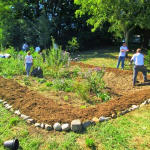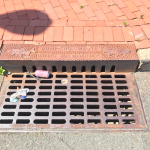New Jersey Future Blog
NJDEP Releases Guidance on Stormwater Utilities, a Tool for Equitable Stormwater Management
April 12th, 2021 by Brianne Callahan
The New Jersey Department of Environmental Protection (NJDEP) recently released guidance on the creation of stormwater utilities, a tool newly available to New Jersey communities to help mitigate flooding and pollution problems. Stormwater utilities are widely considered to be the most equitable way to address stormwater throughout the nation. To learn more about the guidance, and stormwater utilities in general, check out the New Jersey Stormwater Resource Center. The resource center, created by New Jersey Future, is a one-stop-shop, housing technical legal and financial information, case studies, and helpful guidance on stormwater solutions, community process, and public engagement. Sign up to receive regular stormwater utility updates.

Why a stormwater utility?
Climate change and increased development continue to plague New Jersey residents. Increased rainfall has resulted in additional stormwater runoff, leading to more frequent flash flooding, street closings, property damage, and infrastructure failure. Thankfully, solutions like green infrastructure and upgrades to aging and inadequate gray infrastructure can prevent these negative effects. Unfortunately, these measures can be expensive, and without a dedicated funding mechanism, these solutions are often left untapped. One way to fund these solutions is through a stormwater utility. A stormwater utility is a dedicated funding mechanism, specifically enacted to address stormwater issues. It is similar to a water or sewer utility, and fees are collected based on the amount of stormwater a property generates, which is typically a function of how much hard or impervious surfaces are on a property. Throughout the United States, nearly 2000 communities have turned to stormwater utilities to address their flooding and water quality issues.
In 2019, Governor Murphy signed into law the Clean Stormwater and Flood Reduction Act, which enables New Jersey localities to implement stormwater utilities. The act is permissive in nature, allowing but not requiring local governments to act. It requires the NJDEP to provide non-binding technical advice through guidance housed on its website. In reviewing the guidance, we’d like to share four important takeaways:
- Fee Calculations—Fee calculations can be tailored to your community’s needs, and there are many different options that are available under the statute as long as they are based on the amount of impervious surfaces on a property.
- Credits—Credits can be issued if a property owner decreases their generation of stormwater through installation of rain gardens, pervious pavement, green roofs, etc. A locality can structure its credits as it sees fit.
- Allowable Costs—The guidance lists costs that are eligible to be funded through a stormwater utility. Check this section of the site when determining your level of service needs.
- Asset Management—Many costs associated with developing an asset management plan may be financed through the New Jersey Water Bank, which provides low-cost financing for environmental infrastructure projects.
More information about NJDEP’s Stormwater Utility Guidance can be found on its website.
Don’t miss out on learning about this important tool for equitable, dedicated, flexible and stable stormwater funding! Sign up on the New Jersey Stormwater Resource Center to stay informed about developments in stormwater utilities, including key policy updates. Development of the resource center was guided by local engineers, utilities, attorneys, government officials, New Jersey Department of Environmental Protection staff, and the Flood Defense Coalition, to ensure that it addresses local needs.
For any questions about the resource center, or stormwater utilities in general, please feel free to contact Brianne Callahan.
Related Posts
Tags: Clean Stormwater and Flood Reduction Act, Flood Defense Coalition, New Jersey Stormwater Resource Center, NJDEP guidance, Stormwater, stormwater management, stormwater utilities, stormwater utility, Stormwater Utility Guidance
















